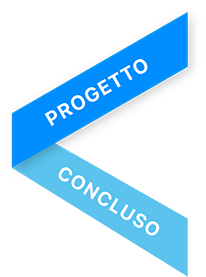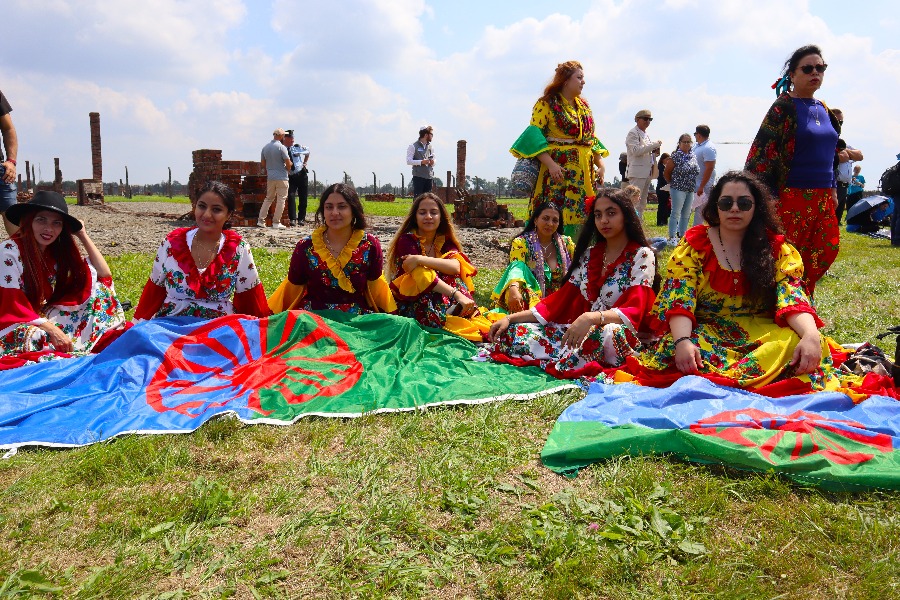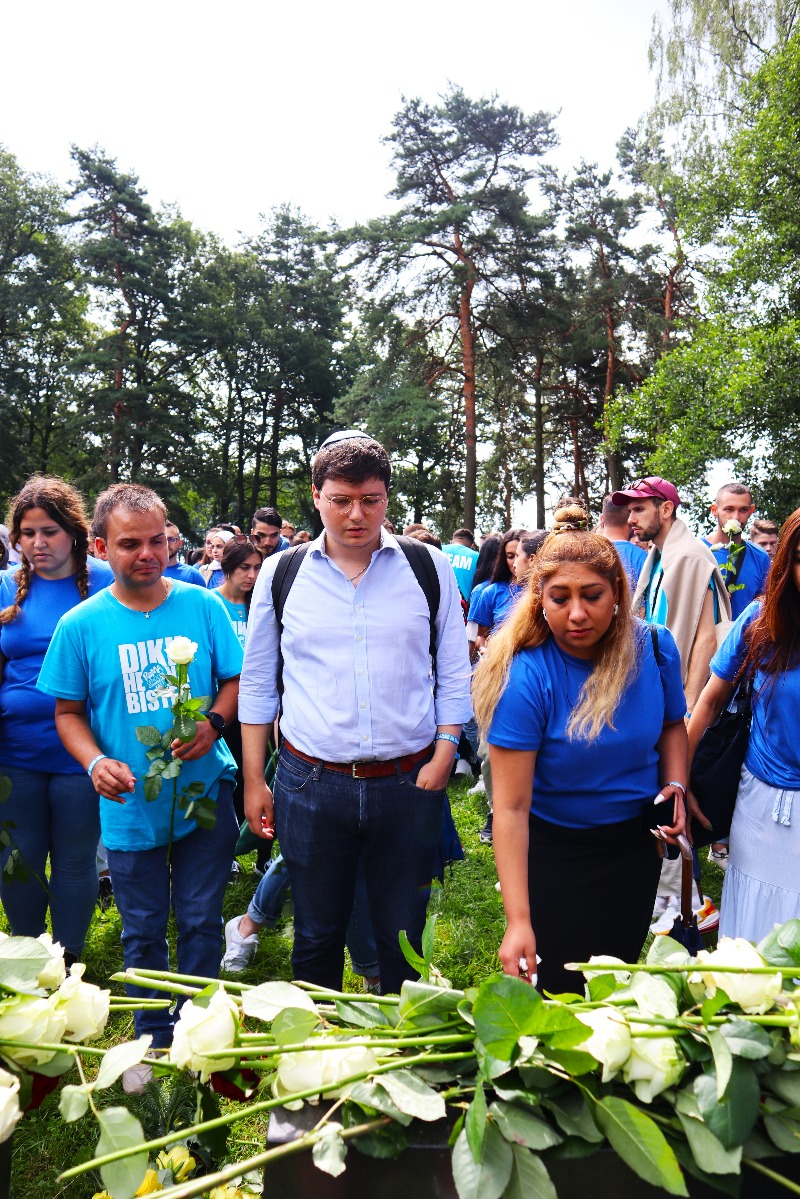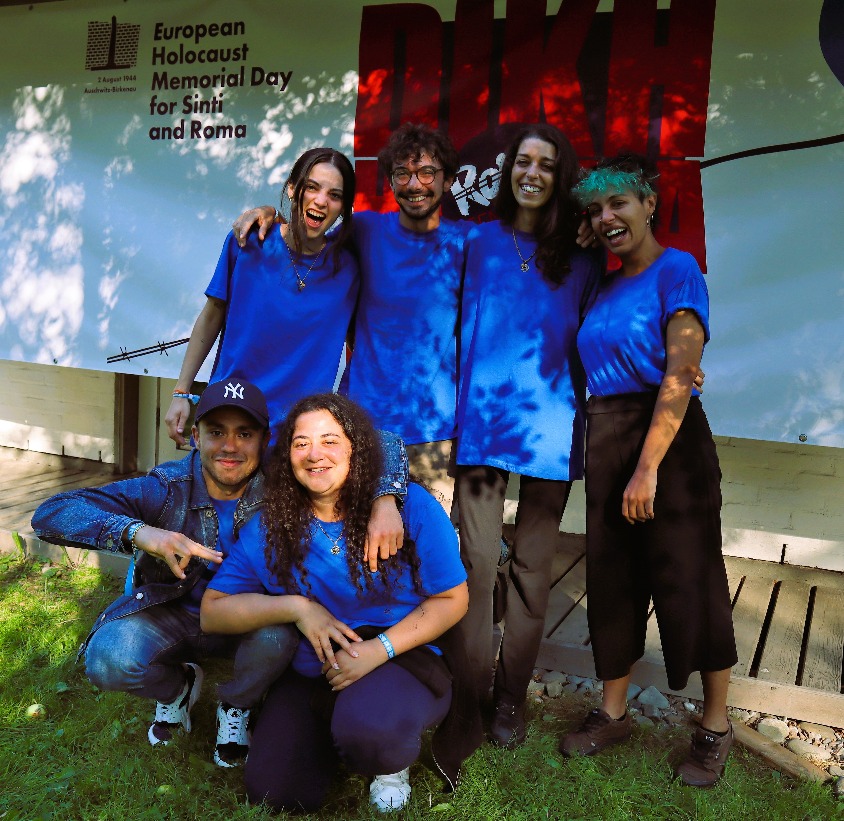Una campagna di Ivana Nikolic
ContattiRecupera la tua password
Inserisci il tuo indirizzo email: ti invieremo una nuova password, che potrai cambiare dopo il primo accesso.
Password inviata
Controlla la tua casella email: ti abbiamo inviato un messaggio con la tua nuova password.
Potrai modificarla una volta effettuato il login.

Il genocidio dei Rom e la scoperta della propria identità
- Raccolti € 1.025,00
- Sostenitori 23
- Scadenza Terminato
- Modalità Donazione semplice Informazioni
Donazione semplice
Scegli la somma con cui vuoi sostenere il progetto e il sistema di pagamento che preferisci tra quelli disponibili. L’autore del progetto riceverà subito la tua donazione.
- Categoria Comunità & sociale
Il Progetto
CLICK HERE FOR ENGLISH VERSION
Il mio nome è Ivana Nikolic e sono un’artista e attivista rom. Arrivata in Italia come profuga dalla guerra dei Balcani, ho vissuto nei campi solo perché colpevole di essere “zingar*”. E nonostante razionalmente sappia di non essere colpevole, mi ci sono voluti anni prima di sbarazzarmi del senso di colpa per essere rom.
Nel 2009 ho visitato Auschwitz e Birkenau, dove si trovava un pannello con l’elenco dei nomi delle persone rom che sono state uccise. Lì ho ritrovato tutti i cognomi della mia famiglia. In quel momento, ho provato così tante emozioni contraddittorie che non ho più potuto tacere e restare invisibile. In quel momento ho detto di essere Rom, ho fatto il mio “coming out etnico”.
Chi sono i Rom
Il termine Rom viene utilizzato per indicare la complessità dei popoli rom, sinti, kalé, manoush e altri gruppi con le stesse origini. Secondo le stime del Consiglio d’Europa, in Europa vivono tra i 10 e i 12 milioni di Rom. Gli stati con il maggior numero di abitanti rom per rapporto alla popolazione sono quelli balcanici. In Italia vivono circa 500.000 Rom, molti dei quali da secoli. Altri invece, come me, hanno raggiunto l’Italia negli ultimi anni emigrando da altri paesi dell’Est Europa.
Cosa chiediamo
Di aiutarci a sostenere le spese di viaggio dall'Italia alla Polonia per 5 ragazz* rom e non rom.Questi ragazz* per molti anni hanno tenuto nascosta la loro appartenenza alla minoranza rom, e negli ultimi mesi stanno trovando il coraggio di parlare apertamente della loro identità. I biglietti per Cracovia per i viaggi da Milano, Roma, Venezia e Torino costano circa 250 euro a testa.


Il genocidio dei Rom e la scoperta della propria identità rom
Tutti noi abbiamo studiato a scuola la Seconda guerra mondiale, la tragedia della Shoah, e conosciamo le immagini dei campi di concentramento. Tutti sappiamo che è stato messo in atto uno sterminio della popolazione ebraica. Più raramente abbiamo sentito dire che non soltanto gli Ebrei sono stati rinchiusi nei campi di concentramento, ma anche i disabili, gli oppositori politici, gli omosessuali e gli “zingari”.
Circa 500.000 Rom sono stati uccisi durante la Seconda guerra mondiale. Così come gli Ebrei, anche i Rom sono stati deportati e internati in campi di concentramento e campi di lavoro forzato.
Nella sola notte tra il 2 e il 3 agosto 1944, più di duemila donne, bambini e anziani rom sono stati uccisi in quello che era lo “Zigeuner-lager” all’interno del campo di concentramento di Auschwitz. Per questo motivo, simbolicamente, il 2 agosto è la giornata internazionale di commemorazione del genocidio dei Rom.
Da alcuni anni l’associazione giovanile TernYpe insieme al Centro Culturale dei Rom e Sinti tedeschi organizza l’evento Dikh He Na Bister (“Guarda e non dimenticare”). I metodi utilizzati per l’evento sono quelli dell’educazione non-formale, e in particolare quelli sviluppati dal Consiglio d’Europa nei manuali “Mirrors” e “Right to Remember”.
Quest’anno, l’incontro si tiene dal 29 luglio al 4 agosto 2023 in Polonia. Giovani ragazze e ragazzi da vari paesi europei si incontrano a Cracovia, visitano Auschwitz-Birkenau, scoprono questa triste pagina della storia e acquisiscono gli strumenti per diventare cittadini più informati e attivi. L’evento è organizzato nella consapevolezza che giovani rom e non-rom insieme possano rendere l’Europa un luogo basato sul rispetto, il dialogo, i diritti umani e le pari opportunità.
DIKH HE NA BISTER simboleggia per molti giovani rom il potere di scrivere la propria storia. Negli ultimi anni, il ricordo e il riconoscimento del genocidio dei Rom sono diventati un elemento chiave del movimento giovanile al fine di ripristinare la dignità e rafforzare la costruzione dell'identità dei giovani rom.
Portare un gruppo di giovani a “Dikh He Na Bister” significa alimentare lo sviluppo di nuova consapevolezza, nella speranza che un giorno questi stessi giovani potranno aiutare altri Rom nel proprio percorso di coming out etnico. Questo può accadere cambiando la narrazione nei nostri confronti. L’obiettivo da raggiungere è il diritto ad avere le stesse opportunità e gli stessi spazi di confronto.
Maggiori informazioni sull’evento si possono trovare sul sito di Dikh He Na Bister, in inglese.
Perché lo facciamo
Vogliamo sensibilizzare i giovani europei, la società civile e i decisori politici sul genocidio dei Rom, nonché sui meccanismi dell'antiziganismo (il razzismo contro le persone rom) in un contesto difficile di crescente razzismo, incitamento all'odio ed estremismo in Europa.
L'anno scorso, cinque ragazze e ragazzi hanno partecipato a questa iniziativa.
Qui il reportage di questa esperienza: https://www.instagram.com/reel/ChIMIcog658/

Per questo abbiamo bisogno del tuo sostegno! Aiutaci anche tu!
Per contribuire va bene qualsiasi cifra tu voglia donare, la partecipazione è libera in base alle tue possibilità.
Grazie per aver letto fin qui. Se non puoi donare, per favore aiutaci a diffondere la campagna parlandone o condividendola.
Il tuo aiuto è davvero prezioso!
* In seguito all'evento in Polonia, dei reportage video e contribuiremo al podcast “+Rom -Rum” su Spotify. Continua a seguirmi su Instagram e Spotify!
ENGLISH VERSION
My name is Ivana Nikolic and I am a Roma artist and activist. When I arrived in Italy as a refugee from the Balkan war, I ended up living in a Roma settlement, simply because I was guilty of being “gipsy”. Even though rationally I know I am not guilty, it took me several years to get rid of the feeling of guilt.
In 2009, I visited Auschwitz and Birkenau, where I saw a panel with a list of names of Roma people who were murdered. There I could read all the surnames of my family. At that moment, I felt many contradictory feelings and I could no longer keep silent and remain invisible. At that moment I openly said that I am Roma, I did my “ethnic coming out”.
Who are the Roma?
The term Roma is used to refer to the wide diversity of Roma, Sinti, Manush, Calé and other groups with the same origins. According to Council of Europe estimates, between 10 and 12 million Roma live in Europe. The states with the higher number of Roma inhabitants in relation to the population are the Balkan states. Around 500.000 Roma live in Italy, and many of them have been living there for centuries. Just this year, the 600th anniversary of the first evidence of the arrival of Roma and Sinti was celebrated in Bologna. Other Roma, like me, have moved to Italy in recent years by emigrating from other Eastern European countries.
What we are asking for
To help us support the travel expenses from Italy to Poland for five Roma and Sinti youngsters. For many years, these young people have hidden their Roma origins, and in recent months they have found the courage to speak openly about their identity. Two ways tickets to Krakow from Milan, Rome or Turin cost around 240 euros for each person.

The Roma genocide and the discovery of our Roma identity
We have all studied WWII in school, the tragedy of the Shoah, and we are familiar with the images of the concentration camps. We all know that the extermination of the Jewish population took place. Rarely we heard that not only Jews were deported to concentration camps, but also disabled people, political opponents, homosexuals, and “gipsies”.
Around 500.000 Roma were killed during WWII. Like the Jews, Roma were deported and interned in concentration and forced labour camps.
On the night between 2nd and 3rd August 1944 alone, more than two thousand Roma women, children and elderly were murdered in what was called the “Zigeuner-familien-lager” at Auschwitz-Birkenau concentration camp. Therefore, symbolically, 2nd of August is the Commemoration Day of the Roma genocide.
For several years, the youth association TernYpe together with the Documentation and Cultural Centre of German Sinti and Roma has organised the event Dikh He Na Bister (“Look and don’t forget”). The methods used for the event are those of non-formal education, and those developed by the Council of Europe in the manuals “Mirrors” and “Right to Remember”.
This year, the meeting will take place from 29 July to 4 August 2022 in Poland. Youngsters from various European countries will meet in Krakow, visit Auschwitz-Birkenau, discover this horrible page of history, and acquire the tools to become more aware and active citizens. The event is organised in the believe that young Roma and non-Roma together can make Europe a place based on respect, dialogue, human rights, and equal opportunities.
DIKH HE NA BISTER symbolises for many young Roma the power to write their own history. In recent years, remembrance and recognition of the Roma genocide have become a key element of the youth movement in order to restore dignity and strengthen the identity building of young Roma.
Bringing a group of young people to “Dikh He Na Bister” means nurturing the development of new awareness, in the hope that one day these same young people will be able to help other Roma on their own ethnic coming-out journey. This can happen by changing the narrative towards us. The goal to be achieved is the right to have the same opportunities and spaces for dialogue.
More information about the event can be found on the Dikh He Na Bister website.
Why do we do this?
We want to raise awareness among young Europeans, civil society and policy makers about the Roma genocide and the mechanisms of antigypsyism (racism against Roma people) in a difficult context of increasing racism, incitement to hatred and extremism in Europe.
Recognition of our history and identity, historical reparation and a profound restoration of our image are the keys to our path towards people’s dignity. We cannot and will not forget the murders of those who never had the opportunity to raise their voice. Young people have an essential role and responsibility to build a peaceful and inclusive Europe today and in the future.
Therefore, we will strengthen the voice and participation of young people, as genocide awareness is a key element of our European identity and the founding principles of European integration. We understand that our call and responsibility as young Roma is to spread knowledge about the genocide of our ethnic minority in mainstream society, from civil society initiatives to institutional visibility. Through our presence at Auschwitz, we want to express our commitment to the struggle for the recognition of our history.
Last year, five young Roma from Italy took part in this initiative. Here a short video about their experience: https://www.instagram.com/reel/ChIMIcog658/
For this we need your support!
Any amount you wish to donate is fine, according to your possibilities.
Thanks for reading this far. If you cannot donate, please help us spreading the campaign by talking about it or sharing it on social media.
We value your support very much!
*Following the event in Poland, we will create an artistic feedback, video reports and contribute to the “+Rom -Rum” podcast on Spotify. Keep following me on Instagram and Spotify!
Commenti (7)